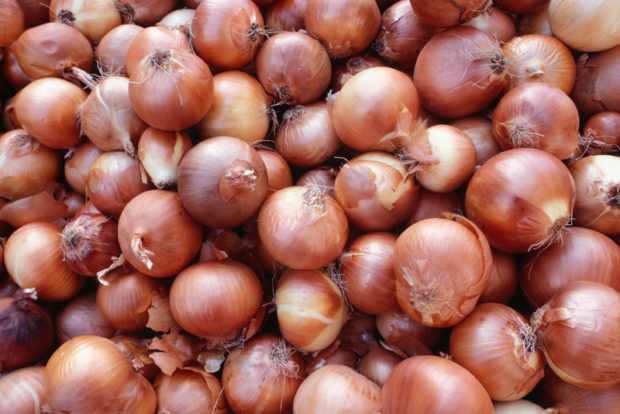22,000 MT of imported onions may arrive in PH this month – DA

Onions. INQUIRER.net stock photo
MANILA, Philippines — Imported onions may arrive in the country between the last week of January and the first week of next month if President Ferdinand Marcos Jr. approves a plan by the Department of Agriculture (DA) to source 22,000 metric tons (MT) of the agricultural commodity.
Agriculture Assistant Secretary Rex Estoperez said on Monday that they were finalizing the recommendation for the importation plan which was expected to lower the price of onions, now selling for as high as P600 a kilo. The plan would then be submitted to Marcos, the concurrent DA secretary.
“The mechanics of importation still needs to be finalized and the BPI (Bureau of Plant Industry) will be the one to finalize it,” Estoperez said in a phone interview, adding that “importation is only a short-term solution, a temporary solution.”
Based on the DA’s price monitoring as of Monday, local red onions retail in Metro Manila at between P480 and P600 per kilo, significantly higher than the P160 to P220 a kilo recorded on Jan. 10 last year.
On the other hand, local white onions sell from P450 to P600 per kilo, also higher than the P80 selling price a year ago.
Article continues after this advertisementEstoperez also reported that the DA did not extend the validity of the suggested retail price for onions at P250 per kilo in Metro Manila’s wet markets which ended on Jan. 7. In October, the DA issued a directive that imposed a price ceiling of P170 per kilo on onions due to its rising retail price.
Article continues after this advertisementThe DA official did not give a categorical answer on whether the agency would impose another price cap on imported onions, saying only that they would closely monitor the situation.
“Just because we allowed the importation doesn’t mean we will leave it at that. We have to protect the farmers while letting consumers buy onions (at low prices),” he said.
Cartel
During a hearing of the Senate Committee on Agriculture, Food and Agrarian reform on Monday, Sen. Cynthia Villar said that they would investigate a cartel that has reportedly been controlling the supply and price of onions.
“At times, it is this cartel that has been creating artificial demand to allow [an] increase in demand and they will control the supply, so that is what we need to address,” she said.
But while the DA’s onion importation plan may even be a welcome solution to curb runaway prices due to low production, some of its officials received a tongue-lashing from Villar for supposedly tolerating unabated meat importation despite enough local supply.
She cited data from the Philippine Statistics Authority, which supposedly showed that since 2019, the country’s supply of locally produced meat has been enough to meet demand, eliminating the need for imports.
But in 2022, the Bureau of Animal Industry (BAI) allowed the importation of 724,532 kilos of meat, even if the 1.7 million kilos of locally produced meat was almost equal to the 1.73 million kilo demand, she noted.
This resulted in an oversupply of up to 686,880 kilos of meat to the detriment of the local livestock industry, Villar said.
She also took issue with BAI acting Director Paul Limson’s defense that the bureau had no control over the volume of imports entering the country and the frequency of importation permits issued for these.
“Who taught you that concept that you do not have control over the importation? If that is a system you came upon, that is wrong. It is clear that you are pushing for importation because you derive personal benefit from it,” Villar said.